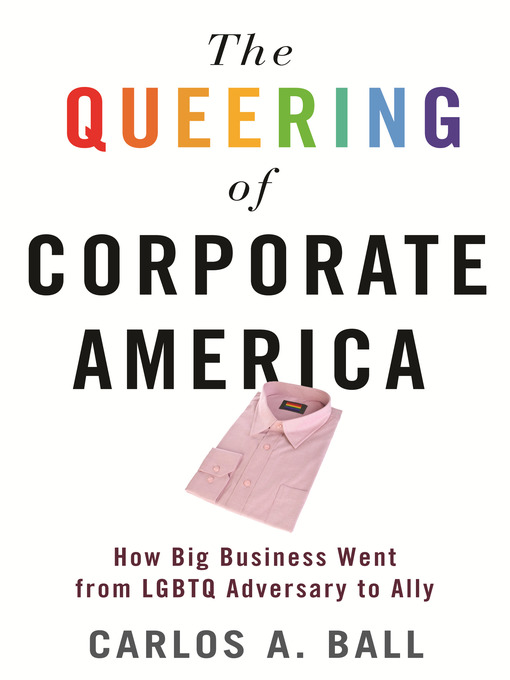The Queering of Corporate America
How Big Business Went from LGBTQ Adversary to Ally
Legal scholar Carlos Ball tells the overlooked story of how LGBTQ activism aimed at corporations since the Stonewall riots helped turn them from enterprises either indifferent to or openly hostile toward sexual minorities and transgender individuals into reliable and powerful allies of the movement for queer equality. As a result of street protests and boycotts during the 1970s, AIDS activism directed at pharmaceutical companies in the 1980s, and the push for corporate nondiscrimination policies and domestic partnership benefits in the 1990s, LGBTQ activism changed big business’s understanding and treatment of the queer community. By the 2000s, corporations were frequently and vigorously promoting LGBTQ equality, both within their walls and in the public sphere. Large companies such as American Airlines, Apple, Google, Marriott, and Walmart have been crucial allies in promoting marriage equality and opposing anti-LGBTQ regulations such as transgender bathroom laws.
At a time when the LGBTQ movement is facing considerable political backlash, The Queering of Corporate America complicates the narrative of corporate conservatism and provides insights into the future legal, political, and cultural implications of this unexpected relationship.
-
Creators
-
Series
-
Publisher
-
Release date
November 12, 2019 -
Formats
-
Kindle Book
-
OverDrive Read
- ISBN: 9780807026359
-
EPUB ebook
- ISBN: 9780807026359
- File size: 660 KB
-
-
Languages
- English
-
Reviews
-
Library Journal
October 1, 2019
From policies of explicit discrimination in the 1970s to fighting against today's backlash against sexual minorities, especially the transgender community, a lot has changed in terms of how corporate sponsors support gay pride--and how it has become commercialized. How and why? Ball (law, Rutgers Univ.) answers these questions by interweaving narrative with analysis, making it clear that change does not happen by chance when it comes to corporate culture in America. Factors such as the role of activists in challenging discrimination, the pressure put on pharmaceutical companies at the height of the AIDS crisis, and the necessity of partnership benefits before Obergefell v. Hodges combine to provide a full business history. The story is brought up-to-date in documenting the role of corporate allies to the LGBTQ community in working together to pressure government not to cave to religious groups trying to stifle gay rights. Ball sees corporate engagement with the community as being an important contributor to the way forward. VERDICT The underlying question remains: Are corporations friends or foes? Ball's history is sure to be controversial and will be of interest to social activists of all stripes.--David Azzolina, Univ. of Pennsylvania Libs., Philadelphia
Copyright 2019 Library Journal, LLC Used with permission.
-
Publisher's Weekly
September 2, 2019
In this meticulous history, Ball (The First Amendment and LGBT Equality), a law professor at Rutgers University, writes eruditely on how the LGBTQ movement masterfully targeted, then conscripted, corporate America into a powerful ally in the fight for equality. The 1970s saw boycotts and antidiscrimination suits; Pacific Bell, then the largest employer in California, had an explicit policy not to hire “open homosexuals” because doing so would “disregard commonly accepted standards of conduct, morality, or lifestyles.” Yet by the mid-1980s it had implemented policies to accommodate HIV-positive employees in the workplace and was considered a “role model” for LGBTQ-friendly firms. The movement successfully pressed for benefits for domestic partners in the 1990s (an opening wedge toward legal recognition of same sex marriage). Today, tech companies such as Angie’s List, Apple, and Salesforce, but also traditional megacorporations such as General Mills and Merrill Lynch, have advocated for LGBTQ policies in the public (as opposed to just the private, corporate) sphere. This progression, Ball astutely notes, has led to an interesting paradox, wherein LGBTQ progressives find themselves embracing corporate America on these issues but confronting them on others, such as antiunion, antiregulatory, and antitax policies. He delivers both an insightful history and an excellent road map for any group seeking progressive social change.
-
Formats
- Kindle Book
- OverDrive Read
- EPUB ebook
subjects
Languages
- English
Loading
Why is availability limited?
×Availability can change throughout the month based on the library's budget. You can still place a hold on the title, and your hold will be automatically filled as soon as the title is available again.
The Kindle Book format for this title is not supported on:
×Read-along ebook
×The OverDrive Read format of this ebook has professional narration that plays while you read in your browser. Learn more here.


